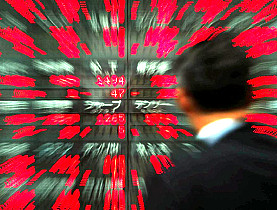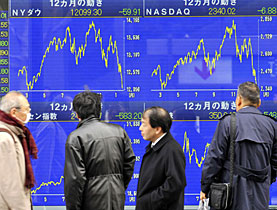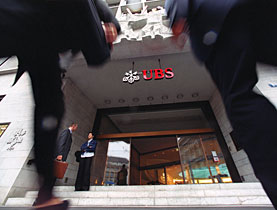Swiss market hits three-year low

Mounting fears that the credit crisis and recession in the United States could spread have battered Switzerland's stock market and its two largest banks.
The Swiss Market Index (SMI), Switzerland’s leading indicator of blue-chip company performance, dipped beneath the 6,500 mark for the first time since August 2005 and reached a low of 6,478.41 before ending Tuesday 1.7 per cent down at 6,561.98.
Things continued to go from bad to worse for UBS, which is already reeling from huge subprime losses and a US tax evasion probe.
Shares in Switzerland’s largest bank tanked to a record low of SFr18 ($17.75), an intraday depreciation of 7.8 per cent, before rebounding to SFr18.30 at close of trade, down 6.3 per cent.
Credit Suisse also felt the squeeze, with its shares sinking below SFr40, their lowest level since summer 2004. Shares in the bank closed on Tuesday evening at SFr39.72, down 4.5 per cent.
The ripples of US uncertainty also affected other sectors in Switzerland.
Shares in Ciba Specialty Chemicals plummeted 12 per cent to an all-time low of SFr24, those of engineering group Sulzer dropped 4.8 per cent and biotech company Actelion saw its share value wither by 5.6 per cent.
Shares in Nestlé and technology concern ABB dropped by 1.4 per cent and 2.6 per cent respectively.
The only Swiss blue-chip worth more at dusk than at dawn was pharmaceutical giant Roche, whose shares rose 1.1 per cent.
Mae day!
Elsewhere in Europe on Tuesday stocks fell 2.1 per cent to a three-year closing low, knocked by growing concerns over the financial services sector, but a steep fall in oil prices helped the market end above the session’s lows.
In the third big sell-off in just over a week, light, sweet crude plunged $6.44 (SFr6.52) to settle at $138.74 on the New York Mercantile Exchange in an extremely volatile session. Prices at one point dropped more than $10 a barrel from the day’s high.
The turnaround may not signal a lasting shift in sentiment – prices have swung violently in recent days as they flirted with record highs – but it does underscore investor uncertainty about the sustainability of sky-high prices and potentially long-lasting effects on the broader economy.
Wall Street was rattled after US Federal Reserve Chairman Ben Bernanke said a weakening housing market, tighter credit and rising oil prices threatened the economy.
In remarks to the US Senate Banking Committee, Bernanke said financial markets and institutions remained under “considerable stress” and faced “numerous difficulties”, adding to jitters over banking stocks.
Bernanke’s comments came only days after the Fed and the Treasury said they would lend financial support to mortgage financiers Fannie Mae and Freddie Mac if necessary.
Angst about the government-chartered companies has sent Wall Street reeling in recent weeks, as companies together hold or guarantee more than $5 trillion in mortgages – nearly half the nation’s total. Fannie and Freddie shares tumbled again on Tuesday.
“Bloodbath”
Switzerland was by no means the only country affected in Europe.
The FTSEurofirst 300 index of top European shares ended 2.1 per cent lower at 1,110.09 points, its lowest close since May 2005. The index, down 26 per cent on the year, fell by more than three per cent at one point in the session, before trimming its losses.
“The sell-off is extremely violent, it’s a bloodbath, and I fear that it could last all summer,” one Paris-based trader said.
Banks took another beating, with Royal Bank of Scotland down 7.1 per cent, Allied Irish Banks down 9.9 per cent and French bank Natixis down 9.7 per cent.
“We’re back into the panic mode we experienced back in mid-March. The distrust is at a very high level and it is totally justified,” said Marie-Pierre Peillon, head of equity and credit research at Groupama Asset Management, in Paris.
“The US housing crisis is getting worse, and it has now spread from the ‘subprime’ segment to the ‘prime’ segment, with regional banks getting hit now,” she said.
“Every banking stock is suffering from that, especially in Europe where many capital increases are in the pipeline while the banks’ shares are now trading below the price tag on their rights issue.”
Peillon said investors were also nervous ahead of quarterly earnings reports from US banks that could shed light on damage from the credit crisis. JP Morgan and Merrill Lynch are due to report results on Thursday.
swissinfo with agencies
Germany’s DAX index ended Tuesday down 1.9 per cent, Britain’s FTSE 100 index fell 2.4 per cent and France’s CAC 40 shed two per cent.
The Swiss Market Index (SMI) is Switzerland’s blue-chip index and is currently made up of the 20 largest and most liquid stocks traded at the Swiss bourse.

In compliance with the JTI standards
More: SWI swissinfo.ch certified by the Journalism Trust Initiative



You can find an overview of ongoing debates with our journalists here. Please join us!
If you want to start a conversation about a topic raised in this article or want to report factual errors, email us at english@swissinfo.ch.